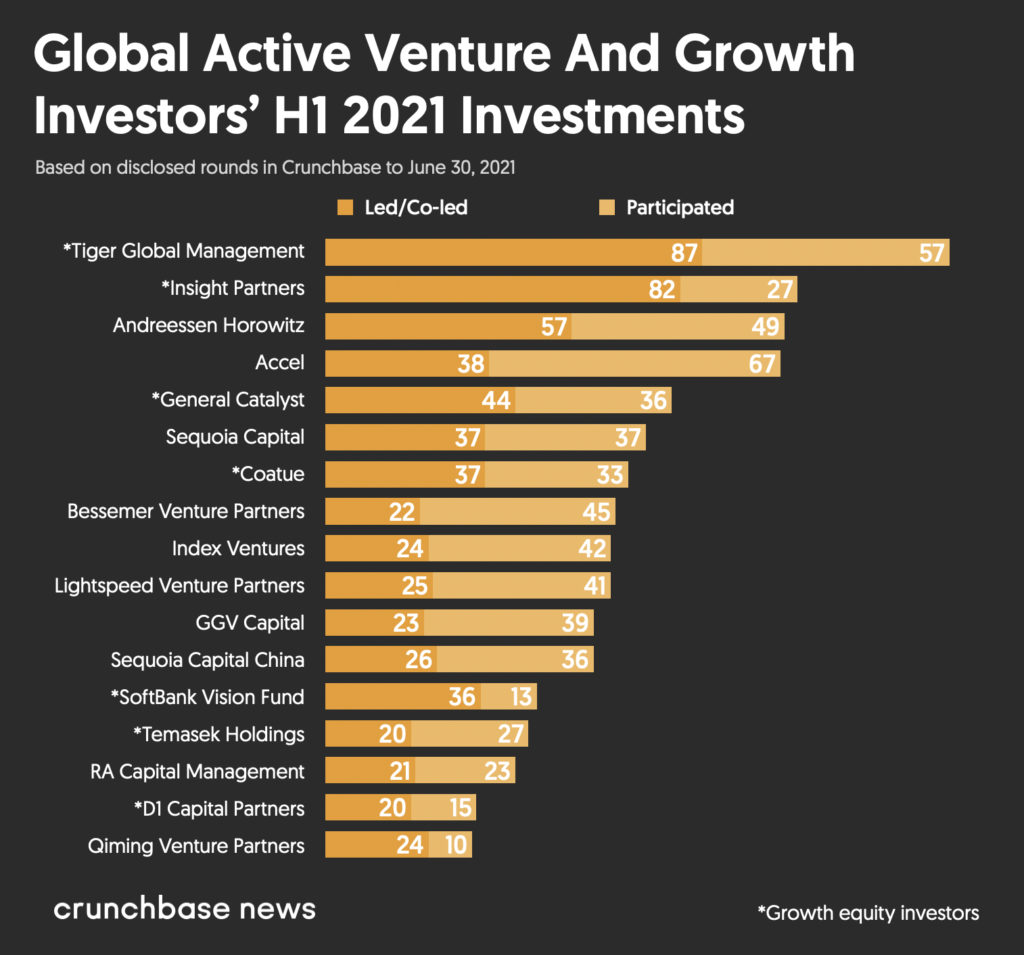Global venture capital funding in the first half of 2021 shattered records as more than $288 billion was invested worldwide, Crunchbase numbers show. That’s up by just under $110 billion compared to the previous half-year record that was just set in the second half of 2020.
Table of Contents
- New funding records
- Increased investing pace
- Record new unicorns
- Record funding by stage
- Public debuts and exits
- Conclusion
- Methodology
- Glossary of funding terms
New funding records
A greater number of those venture-backed companies have gone public valued above $10 billion so far this year — just half-way in — than in all of 2020. And already this year, another 250 companies have joined the Crunchbase Unicorn Board, compared to 161 new unicorns for the whole of 2020.
The backdrop for all of this activity in the venture ecosystem is strong first-quarter earnings for leading technology stocks as countries slowly emerge from the pandemic. On July 2, both the S&P 500 and the Nasdaq composite index hit all-time highs.
Subscribe to the Crunchbase Daily
“In the past 12 months, there has been a cavalcade of exits that in almost any year, prior to the last few, would have been among the largest exits in venture history by absolute dollars,” even if adjusted for inflation, said Ben Savage of Clocktower Technology Ventures, a Santa Monica-based fintech venture investor that also manages separate public market funds.
This increase in large exits in the past five years signifies a real change in the private markets, according to Savage. Larger institutional allocators are recognizing this, “which leads to more capital flowing into funds that invest in private companies, and directly into private companies,” allowing companies to stay private and creating a tremendous amount of value.
Crunchbase numbers show that global venture funding in the first half of 2021 surged 61 percent compared to the prior peak of $179 billion in the second half of 2020. That’s up 95 percent compared with the first half of 2020, when venture investors deployed $148 billion globally.
Growth and PE investors as a cohort have invested more dollars in rounds they led this year so far compared to the whole of 2020. The same can be said for venture investors, as well, by the half-year mark.
All told, 17 companies have raised rounds above a billion dollars through the first half of this year, including Northvolt, Waymo and Celonis.
Notably, Istanbul-based delivery company Getir raised its Series B, C and D all in a six-month period totaling $983 million across these three subsequent funding rounds that valued the company from $850 million for its Series B to $7.5 billion in the Series D.
Record funding was invested at every stage in the first half of this year. Late-stage funding peaked the most, more than doubling year over year, per Crunchbase numbers. Early-stage funding grew more than 60 percent over the prior two half-year time-frames and seed funding gained 40 percent year over year.

Increased investing pace
Growth equity investors Tiger Global Management and Insight Partners racked up the most portfolio companies for the first half of the year, according to Crunchbase data.
Tiger Global — whose breakneck investing pace this year we’ve written about previously — added 110 new portfolio companies. It has led 87 rounds in new and existing portfolio companies, averaging more than 14 rounds led per month. The firm has added 58 unicorn companies to its portfolio already this year.
Insight Partners added 71 new portfolio companies in the same timeframe, but led more rounds — totaling 82 for new and existing portfolio companies.
Venture firms Andreessen Horowitz, Accel and growth equity investor General Catalyst round out the top five active investors year to date.

A long list of growth equity investors also makes up the roster of firms leading or co-leading deals with the largest amounts committed to private companies.
Tiger Global tops that list, followed by SoftBank Vision Fund, Insight Partners, Coatue, Silver Lake, Fidelity, D1 Capital Partners and T. Rowe Price by funding amounts led or co-led.
Sequoia Capital — notably, the only venture firm listed in the top 10 — is followed by GIC, Goldman Sachs, Hillhouse Capital, General Catalyst and DST Global. Across the 390 deals these funds led, only 26 deals had a co-lead among these 14 investors.

Record new unicorns
At the half-year mark in 2021, 250 companies have joined the Crunchbase Unicorn Board, compared to 161 new unicorns for the whole of 2020. The board now counts 879 private companies collectively valued at close to $3 trillion that have altogether raised $564 billion.
Of these 250 companies newly valued $1 billion and above, 161 — more than half — are headquartered in the U.S.
China and Canada score the next highest count with 10 each. India and Germany have nine new unicorns each, and Israel, the U.K. and France each have seven.
These 250 new unicorns have collectively raised $78 billion over time and have added $419 billion in post-money valuation to the Crunchbase Unicorn Board.
Record funding by stage
Late-stage funding growth
Late-stage funding has only gotten hotter as the year has progressed. More than $100 billion was invested globally in the second quarter, up from $91.5 billion in the first quarter. The most recent quarter is also up more than $40 billion compared to quarterly funding totals for each quarter in 2020, per Crunchbase figures.
This year’s surge also represents large fundings to a greater number of companies at the later stages, with more than 1,600 having raised late-stage funding this year so far.

Early stage
Early-stage funding peaked at $43.4 billion to over 1,900 startups globally in the second quarter of 2021, up 66 percent year over year.

Seed funding
Over $6 billion was invested in more than 3,500 seed-stage startups in the first half of the year. It’s worth noting that seed funding counts typically increase over time, as these deals are often added to the Crunchbase dataset after the close of the quarter.

Public debuts and exits
Eight companies made public market debuts above $10 billion this past quarter, bringing the total number to 16 so far in 2021. That’s the highest count in the last decade.
In 2020, 13 venture-backed companies debuted at a valuation above $10 billion. We count a total of 16 public market debuts above $10 billion in the prior nine years.
San Francisco-based Coinbase, a 9-year-old company, is the largest public debut via a direct listing this past quarter, valued at $86 billion at the end of its closing day. Coinbase had raised more than $500 million as a private company. As of July 1, the company is valued at $50.4 billion.
Beijing-based ride hailing service Didi, also 9 years old, is the second-most highly valued IPO this past quarter, at $73 billion. The company has raised more than $20 billion in funding as a private company.

More growth firms investing directly
As we look back at 2021, can this unprecedented pace of dealmaking and dollar commitments from these leading firms continue in the latter half of 2021?
More than 50 growth equity investors have invested more than $1 billion in deals they have led or co-led so far in 2021, Crunchbase figures show. These include private equity firms, hedge funds, investment banks, sovereign wealth funds and pension funds investing directly in private companies.
We found similar trends in 2020, when 47 growth-equity investors led more than $1 billion in rounds. The commitment from growth investors to invest directly in private companies is not new but has grown the last five years, peaking in the first half of 2021.
Multistage venture investors that have led or co-led rounds above $1 billion are up to nine so far in 2021 and 15 in total for 2020.
There are now close to 900 unicorn companies across the globe, some of which will likely seek to go public soon. Investors are betting that the next Spotify, Shopify, Netflix, PayPal, Alibaba, Tesla, Facebook, Google or Amazon has yet to go public.
“As we come out of the pandemic, it just became clearer and clearer how important this next generation of technology-powered high-growth businesses are going to be,” said Clocktower’s Savage, who expects this shift in assets to continue. “We will all look back in 15 or 20 years and venture capital as an asset class and the associated sort of derivative asset classes from traditional VC will be much, much bigger.”
Crunchbase Pro queries used for this analysis
Funding & Exits
- Global funding in 2021
- Companies that recently went public
- Recent acquisitions (venture-backed)
- Tiger Global Management fundings in 2021
Unicorn queries
- Unicorn leaderboard (877)
- Unicorns in Asia (315)
- Unicorns from India (40)
- European unicorns (108)
- Emerging unicorn leaderboard (252)
- Exited unicorns (299)
- 2021 unicorn IPOs (56)
- Unicorn fundings in 2021 ($124 billion)
Methodology
The data contained in this report comes directly from Crunchbase, and is based on reported data. Data reported is as of July 6, 2021.
Note that data lags are most pronounced at the earliest stages of venture activity, with seed funding amounts increasing significantly after the end of a quarter/year.
The most recent quarter/year will increase over time relative to previous quarters. For funding counts, we notice a strong data lag, especially at the seed and early stages, by as much as 30 percent to 40 percent a year out.
Please note that all funding values are given in U.S. dollars unless otherwise noted. Crunchbase converts foreign currencies to U.S. dollars at the prevailing spot rate from the date funding rounds, acquisitions, IPOs and other financial events are reported. Even if those events were added to Crunchbase long after the event was announced, foreign currency transactions are converted at the historic spot price.
For M&A transaction analysis, we include venture-backed companies and exclude companies that previously went public.
Glossary of funding terms
Seed and angel consists of seed, pre-seed and angel rounds. Crunchbase also includes venture rounds of unknown series, equity crowdfunding and convertible notes at $3 million (USD or as-converted USD equivalent) or less.
Early-stage consists of Series A and Series B rounds, as well as other round types. Crunchbase includes venture rounds of unknown series, corporate venture and other rounds above $3 million, and those less than or equal to $15 million.
Late-stage consists of Series C, Series D, Series E and later-lettered venture rounds following the “Series [Letter]” naming convention. Also included are venture rounds of unknown series, corporate venture and other rounds above $15 million.
Technology growth is a private-equity round raised by a company that has previously raised a “venture” round. (So basically, any round from the previously defined stages.)
Illustration: Dom Guzman
Correction: Eight venture-backed public debuts above $10 billion in Q2 2021 and sixteen for H1 2021.

Stay up to date with recent funding rounds, acquisitions, and more with the Crunchbase Daily.









![Illustration of pandemic pet pampering. [Dom Guzman]](https://news.crunchbase.com/wp-content/uploads/2021/03/Pets-2-300x168.jpg)

67.1K Followers